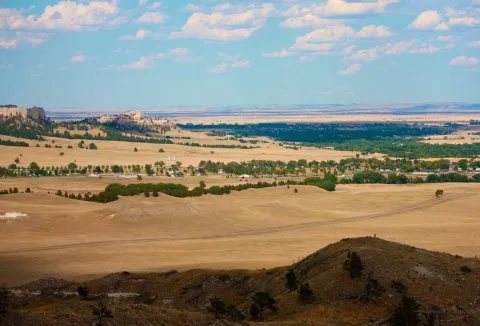
Nebraska, often referred to as the "Cornhusker State," offers a unique blend of rural charm and urban amenities, making it an appealing option for retirees. In this article, we'll explore the key factors that make Nebraska an attractive destination for retirement, including overall quality of life, cost of living, crime and safety, access to quality healthcare, weather, and culture. We'll also compare these factors to the national average to provide a well-rounded perspective.
Nebraska consistently ranks high in terms of overall quality of life. The state's low population density and wide-open spaces provide a peaceful and relaxed atmosphere, perfect for retirees seeking a slower pace of life. The state boasts a strong sense of community, with friendly locals and numerous small towns that offer a tight-knit feel. Compared to the national average, Nebraska's low unemployment rate and stable economy contribute to a secure and comfortable lifestyle.
In addition to its serene environment, Nebraska offers various recreational opportunities, from hiking and fishing in its numerous state parks to cultural activities in its cities. The state's low traffic congestion and well-maintained roads make travel easy and stress-free.
Nebraska's cost of living is generally lower than the national average, making it an attractive option for retirees on a fixed income. Housing costs, in particular, are significantly lower, with affordable options in both urban and rural areas. The median home price in Nebraska is well below the national median, allowing retirees to stretch their savings further.
Utilities, groceries, and transportation costs are also more affordable than the national average. This lower cost of living means that retirees can enjoy a comfortable lifestyle without the financial strain often experienced in more expensive states.
Nebraska is considered one of the safer states in the U.S., with crime rates generally below the national average. The state's violent crime rate is significantly lower, contributing to a sense of security for its residents. Property crime rates are also below the national average, further enhancing the state's appeal for retirees.
The state's smaller population and strong community ties contribute to its overall safety. Many towns and cities in Nebraska have low crime rates, making them ideal places for retirees to settle down and enjoy a peaceful retirement.
Access to quality healthcare is a crucial factor for retirees, and Nebraska performs well in this area. The state is home to several reputable healthcare systems and hospitals, particularly in larger cities like Omaha and Lincoln. Nebraska's healthcare facilities are known for their high-quality care and patient satisfaction.
While rural areas may have fewer healthcare options, the state's telemedicine initiatives and outreach programs help bridge the gap. Compared to the national average, Nebraska's healthcare costs are relatively affordable, making it easier for retirees to manage their medical expenses.
Nebraska has a relatively high overall tax burden compared to other states, primarily due to its significant reliance on property taxes. The state imposes individual income taxes, property taxes, and sales taxes, which together contribute to a tax burden that ranks higher than the national average. While Nebraska's income tax rates are moderate, the property tax rates are among the highest in the country, placing a considerable strain on homeowners and agricultural landowners.
When compared to other states, Nebraska's tax burden is generally higher than in states with no income tax or lower property tax rates. However, it may be more favorable than states with both high income and property taxes. Overall, residents in Nebraska experience a heavier tax load than those in many other parts of the country, making it less competitive in terms of tax affordability.
Nebraska's culture is deeply rooted in its agricultural heritage, but the state also offers a rich cultural scene that includes arts, music, and sports. The state's larger cities, like Omaha and Lincoln, boast vibrant arts communities, with theaters, museums, and galleries showcasing local and national talent. The state's commitment to preserving its cultural heritage is evident in its numerous historical sites and events.
The state has a strong tradition of college sports, particularly football, with the University of Nebraska's Cornhuskers enjoying a passionate fan base. This enthusiasm for sports fosters a strong sense of community and provides numerous opportunities for social engagement.
Compared to the national average, Nebraska's cultural offerings may be more modest in scope but are rich in local flavor and tradition. The state's emphasis on community and family values is evident in its numerous festivals and events that celebrate local culture.
Nebraska experiences a continental climate, characterized by hot summers and cold winters. The state's weather is a consideration for retirees, as it varies significantly throughout the year. Summers can be warm, with temperatures often reaching the 80s and 90s, while winters can be cold, with temperatures frequently dropping below freezing.
While the state receives a fair amount of snowfall, it also enjoys plenty of sunshine throughout the year. The weather in Nebraska is generally milder than in some northern states, but retirees should be prepared for a range of seasonal conditions. Compared to the national average, Nebraska's weather is more variable, but it offers four distinct seasons, which can be a draw for those who enjoy seasonal changes.
Nebraska offers a compelling blend of affordability, safety, and quality of life, making it an attractive destination for retirees. Its lower cost of living, safe environment, access to quality healthcare, and rich cultural heritage provide a well-rounded retirement experience. While the state's variable weather may not be for everyone, those who appreciate four distinct seasons will find Nebraska a welcoming place to call home. Overall, Nebraska stands out as a state that offers a comfortable and fulfilling retirement lifestyle, with many advantages over the national average.




